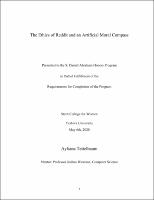Please use this identifier to cite or link to this item:
https://hdl.handle.net/20.500.12202/5649| Title: | The Ethics of Reddit and an Artificial Moral Compass |
| Authors: | Waxman, Joshua Teitelbaum, Ayliana |
| Keywords: | Senior honors thesis algorithms moral compass social media |
| Issue Date: | 6-May-2020 |
| Publisher: | New York, NY. Stern College for Women. Yeshiva University. |
| Citation: | Teitelbaum, Ayliana. The Ethics of Reddit and an Artificial Moral Compass. Presented to the S. Daniel Abraham Honors Program in Partial Fulfillment of the Requirements for Completion of the Program. Stern College for Women. NY: Yeshiva University, May 6th, 2020. Mentor: Professor Joshua Waxman, Computer Science. |
| Abstract: | In this paper, an analysis was done on the AITA subreddit, looking at the submissions posted and the rulings they received. Using different feature selection methods and machine learning algorithms, the models attempted to learn to predict the ruling for a new submission. For learning to predict the ruling given by specific prolific redditors, the models had an accuracy of slightly above a random guessing baseline. However, to predict the top ruling on a submission, the models achieved an accuracy well above the random guessing baseline. Additionally, analysis was done on the topics of different submissions, and how the distributions of rulings were different among different topics. A similar analysis was then done on the difference in the distributions of rulings given to male and female writers of submissions. ========= There is more analysis that can be done on the data in this subreddit. The subreddit is a very interesting data source, giving a large amount of data on different moral situations and how people would judge them. More complex text analysis on the submissions to create features that are a more accurate representation of the data could be helpful in teaching the models to better predict the rulings on different submissions. However, the moral questions asked are complex and have nuance and subtlety that often leave people arguing among themselves. Therefore, with the text processing algorithms available now, it is unclear if it is possible to create models to predict the ruling given more accurately. As more complex and precise text processing methods are created, perhaps it will be possible, using this data, to create models that machines can use to answer moral questions, giving them an artificial moral compass. |
| Description: | Senior honors thesis. Open Access. |
| URI: | https://hdl.handle.net/20.500.12202/5649 |
| Appears in Collections: | S. Daniel Abraham Honors Student Theses |
Files in This Item:
| File | Description | Size | Format | |
|---|---|---|---|---|
| Ayliana_Teitelbaum_Thesis OA May2020.pdf | 800.9 kB | Adobe PDF |  View/Open |
This item is licensed under a Creative Commons License

